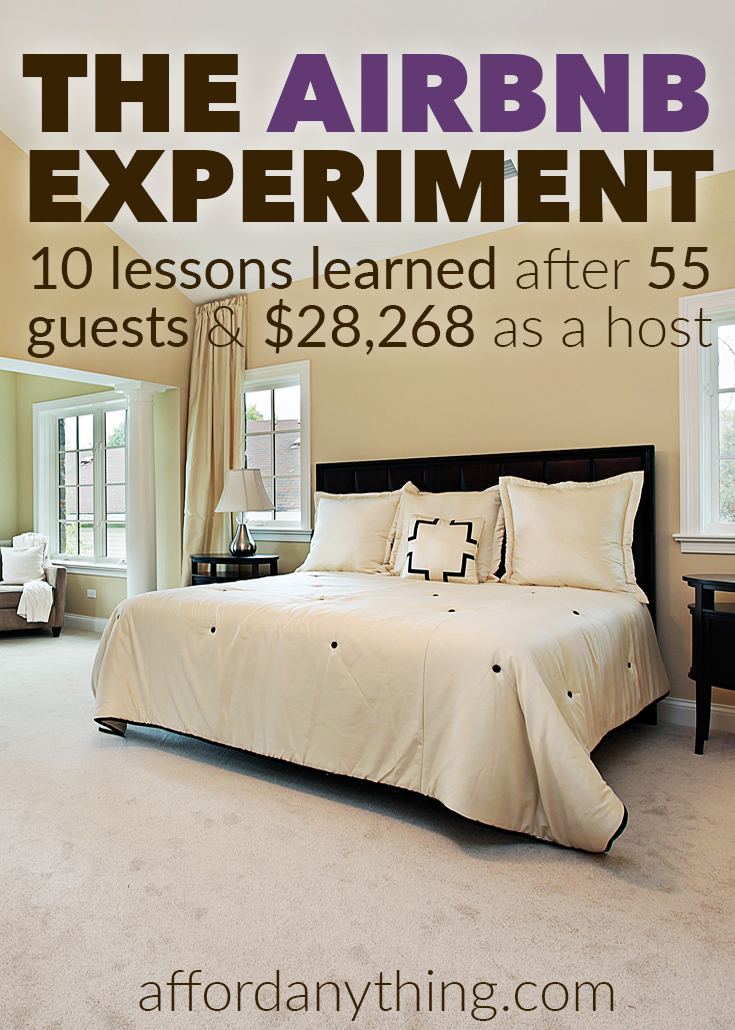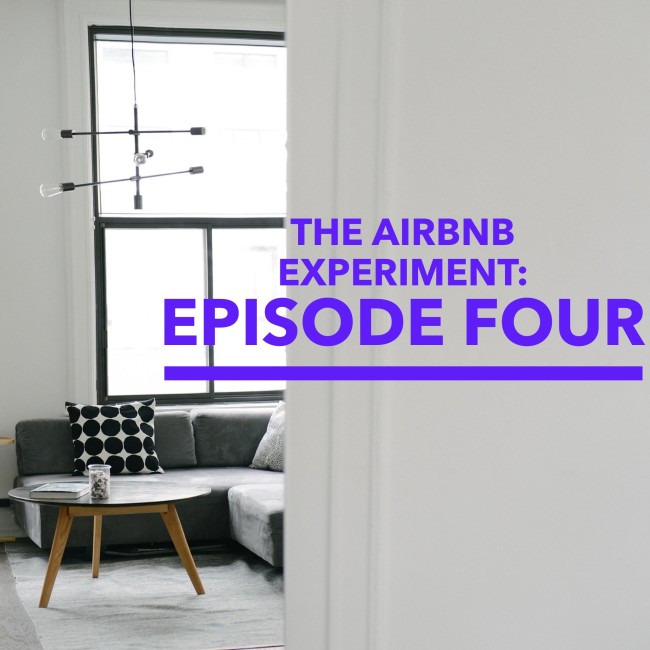
This article is Part 4 of The Airbnb Series. Before you read this, check out Part 1, Part 2 and Part 3.
Almost one year ago, I took the crazy leap into becoming an Airbnb and VRBO host.
Since then, I’ve earned $28,268.35. I’ve met some fascinating people from around this world. And yes, I had one police visit.
In this 4-part Airbnb Series, I’ve pulled back the curtain. I’m revealing the good, the bad and the ugly.
How lucrative is this … and how many years has it shaved off my life? 🙂 More importantly, what advice would I share with others who want to try this?
The Airbnb Experiment: Origins
Background for New Readers: I’m a “mom-and-pop” landlord.
I own five rental properties (encompassing seven rental units).
One of these is a “triplex,” which is like a duplex, but with three units instead of two. (You can also conceptualize it as an apartment building with only 3 units.)
I live in one of these units and rent out the others.
When Airbnb hosting became en vogue [along with cupcakes, food trucks, hackathons, yoga pants and everything else trending], I decided to launch an amusing experiment.
Everyone kept saying I could earn more money as an Airbnb host. [By “everyone,” I’m referring to friends who don’t know jack squat about investing].
I wanted to test their theory.
Sure, the nightly sticker price for an Airbnb rental is higher — but so are the expenses, like vacancies, utilities and supplies.
What’s more lucrative? Airbnb hosting or traditional long-term leasing?
Here are the results.
One Year as an Airbnb Host.
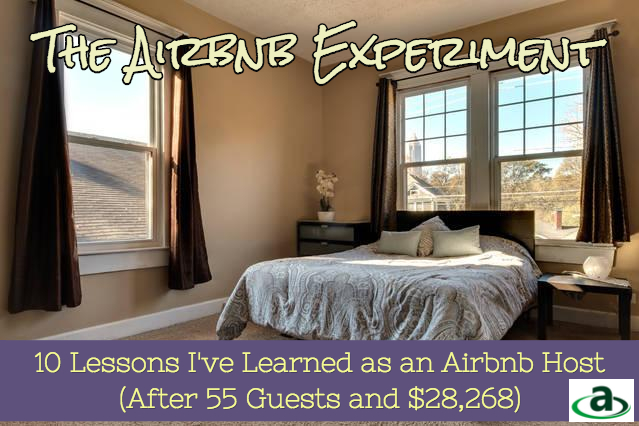
I’m now celebrating my one-year anniversary of the Airbnb Experiment. (YAY!) In the past 12 months, I’ve grossed $28,268.35, which averages to $2,355.70 per month. This is higher than my starting salary at my first job after college (after adjusting for inflation.) Wowza!
(*Note: I’m calling this the “Airbnb Experiment” for the sake of ease, although — as you can see — bookings also come from VRBO.com — Vacation Rental By Owner — associated with HomeAway.com and VacationRentPayment.com)
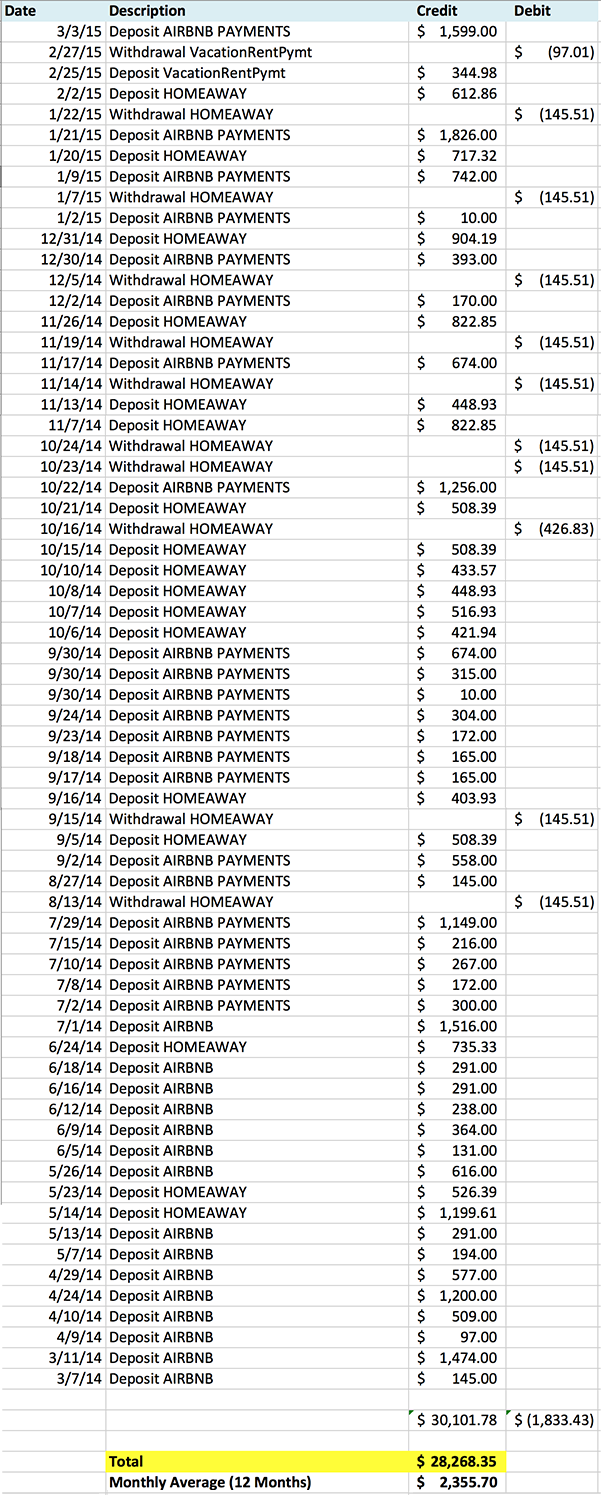
*Note: “Debits” refers to security deposits I’ve refunded. Airbnb holds security deposits on my behalf, so I don’t need to process it, while VRBO/Homeaway sends me the deposit, which I later refund.
Naysayers love uttering defeatist statements like, “In this economy, it’s impossible boost your income!” Guess what, naysayers: Here’s an example of one side gig that grosses more than my former salary, while occupying only a few hours per month. A little bit of hustle goes a long way.
Ready for the next step? Let’s peek at the Airbnb and VRBO-specific expenses.
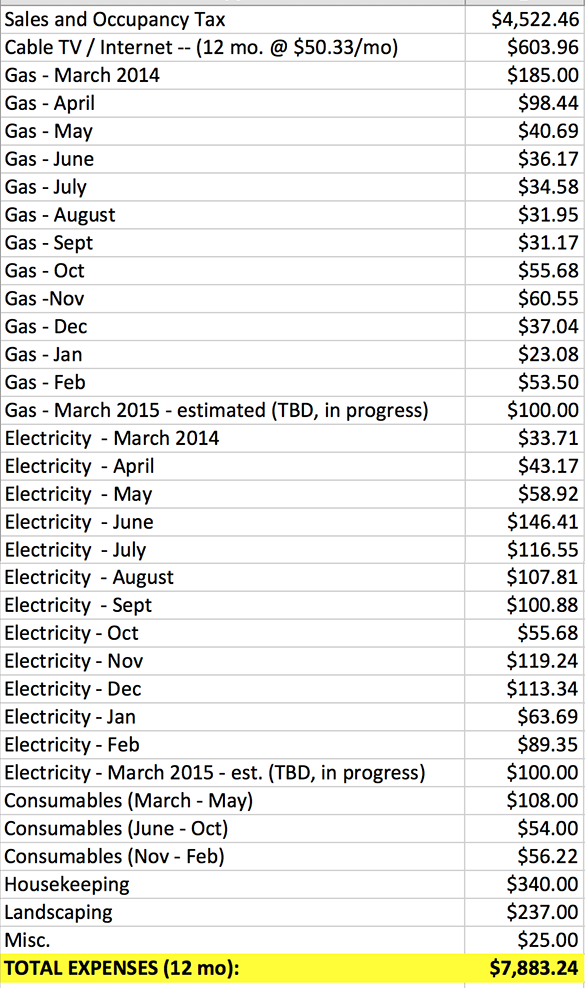
*Note: In the previous article, I accidentally labeled “electric” as “gas” and vice versa. The numbers are the same; they’re just reversed between electric and gas. I’ve corrected it in this spreadsheet.
*Note: I received a payment at the start of March that spans the entire upcoming month (March 2015). To be fair, I estimated the future electric and gas bill for March, as well, even though these are still TBD. I over-estimated both of these, to err on the safe side.
What does this mean?
- Traditional Lease: On a traditional 12-month lease, I would have grossed $13,200 and would have none of the Airbnb-specific expenses listed above.
- Airbnb Host: By offering this property as an Airbnb unit, I grossed $28,268.35 and had an additional $7,883.24 in Airbnb-specific expenses, leaving me with an Airbnb income of $20,382.11.
- Difference: In 12 months, I earned $7,185.11 more as an Airbnb host vs. traditional leasing. This breaks down to an extra $598.76 per month.
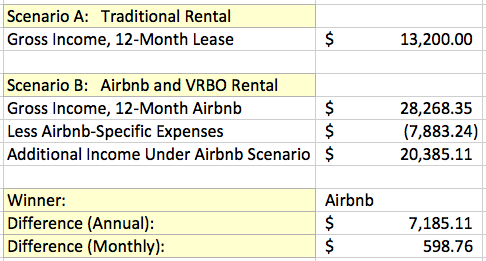
One-Sentence Summary: Being an Airbnb host brings me about $600 per month more than traditional long-term leasing, after adjusting for the added expenses. Score!!
(By the way, if you’re interested in hosting, use this estimator to find out how much you could earn as an Airbnb host.)
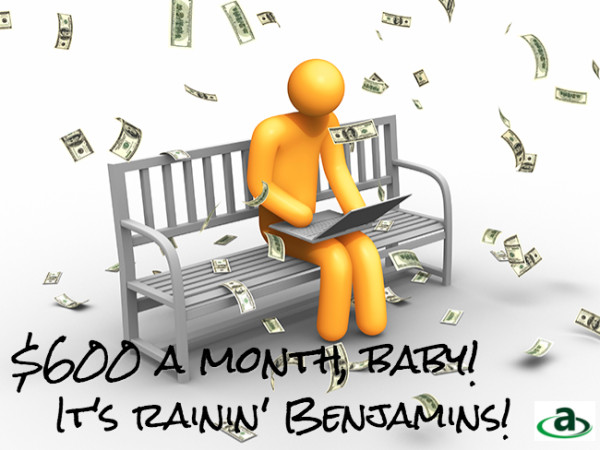
This is remarkably similar to the monthly average I concluded during the 8-month update, which shocks me, since I had a three-week vacancy in December around the holidays. We’re analyzing a larger sample size, so outlier months don’t skew the results as much.
What’s Your Hourly Rate as an Airbnb Host?
In previous updates, I’ve calculated my hourly rate as anywhere between $54 to $92 per hour. I haven’t logged my time, but two hours per turnover is a reasonable approximation. That’s 90 minutes of cleaning and 30 minutes of emails, texts, and other administration. I’ve hired a housecleaner on a few occasions, but I also take care of miscellaneous oddities, so we’ll call it even.
I’ve now hosted 55 guests, which comes to a total of 110 hours. An additional $7,185.11 over the span of 110 hours equals $65.31 per hour.
I’ve done most of the housecleanings myself, although I don’t recommend this. I personally chose it for four reasons:
- I live in the building (no transit time)
- I make my own hours (total flexibility)
- I enjoy a break from staring at a computer screen. (I like the novelty of a few hours of ‘hands-on’ work, even if it’s low-paid labor. That’s the same reason I fold my own laundry instead of hiring it out, at least for the moment.)
- I had trouble finding a reliable housekeeper (one cleaner arrived several hours late; the other no-showed), so I got into the habit of doing it myself — admittedly, that’s a temporary band-aid solution and not something I recommend if you’re in this for the long-haul.
FAQs:
- “What about your mortgage?” — The experiment compares long-term leasing to short-term hosting. We’re comparing between Scenario A and Scenario B. Property-wide costs (like the mortgage) are constants, not variables, so they don’t affect the outcome. (Plus the mortgage covers the entire triplex, not just one unit.) This article shares full details on all triplex expenses, and this article shares critical information on how to evaluate a rental property.
- “What about that one bad guest?” — Yes, I’ve had that one terrible guest — and I’ve had to remind myself to climb back into the saddle and keep riding. The reality is that I’ve hosted 55 guests, and 54 of them have been awesome. No reason to let one bad guest spoil the party.
- “Do you leave a gap between check-in and check-out?” While I know other Airbnb and VRBO hosts who choose to leave a one-day gap between guests, I’m willing to book the unit with back-to-back guests, since the “value” of a vacant unit represents an opportunity cost of $100 per night. This does create additional stress, though, especially when a guest checks-out late and the next one arrives early.
- “What are consumables?” — Soap, shampoo, paper towels, sponges, detergent and other household goods, as well as housewares that need occasional replacement, like worn-out doormats, broken wine glasses, and air mattresses that spring leaks.
- “Why do you have cable TV?” — Customer service is my #1 priority. I’ve never purchased cable for myself — literally, never — but if this gives my customers a better experience, I’m happy to buy it. This is the same reason I bought a dedicated wifi router: yes, it’s more expensive, but it gives the guests faster wireless internet, which makes for a better customer experience.
Wow, are you still reading? Alright, if you’re super-into the idea of Airbnb hosting — don’t miss this next section. Here’s the culmination of a year’s worth of (hard-won) wisdom. Think of this as a shortcut for you. Here are 10 lessons I’ve learned as an Airbnb Host.
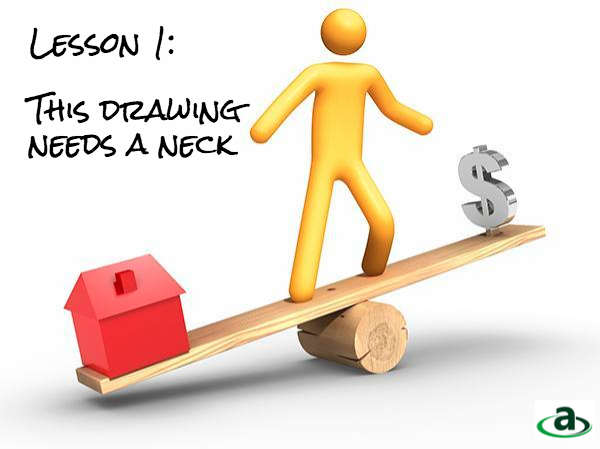
#1: This Isn’t Real Estate; It’s Hospitality
Traditional rentals are “commodities.” You’re leasing four walls and a roof, plus the most bare-bones level of service (urgent repairs).
Airbnb hosting is service-sector hospitality. Your role is closer to that of a hotel concierge than a landlord. You offer guests a complimentary bottle of water; provide directions to nearby landmarks; answer questions about the weather. You’re not leasing some assembled drywall and roofing shingles; you’re selling an experience and a feeling.
#2: You Learn Awesome Customer Service
Because hosting falls into the “hospitality” industry, you’re competing on great customer service — which means you learn these skills quickly.
For example: Technically, Airbnb says that the host should provide enough consumables to get started for a week, and long-term guests should replenish supplies. When long-term guests ask for more laundry detergent or trash bags, I could theoretically point to that page on the Airbnb site, and say, “Not my problem, yo.”
But why act petty? Just buy the damn detergent. It takes 10 minutes, it costs $5, and it results in a happier guest. #CustomerServiceVictory. Remember, you’re selling an experience, not just four walls and a roof.
#3: Most People Suck at Negotiating
Roughly 1 in 10 potential guests ask for a discount, but they phrase it in the most ludicrous manner:
“We’re coming to Atlanta for a friend’s bachelorette party, and we’ve spent a lot of money on her wedding. Can you lower your price to $50 a night?”
Uh, no.

Reason #1: Humans vs. Business
First, these guests don’t realize that they’re asking me to subsidize their vacation out of my own pocket. I put that money towards the mortgage.
When you’re an individual, some people don’t recognize that you’re also a (one-person) business — just as David’s Bridal and Absolut Vodka are businesses. These guests aren’t asking the liquor store or the bridal-gown shop for a discount; why should they expect one from me?
My theory is that they’re comfortable asking because:
- I’m the final decision-maker, so I have the authority to haggle.
- I’m a human, not a faceless enterprise, so (some people) don’t consider my need to get paid for my time, effort and risk. They feel like they’re crashing at a friend’s house.
Reason #2: Wants vs. Needs
They’re asking for a discount on a “luxury rental.” Appealing to my sense of charity doesn’t make sense when they can choose a cheaper option.
Whenever I get a Subsidize Me request, I respond with:
“I understand your budget might be tight. I recommend searching Airbnb for listings that are in shared units (roommate-style), which are cheaper than renting a private home. You’ll share a common kitchen and living area, but you’ll pay a fraction of the cost.
If you want a private space, rent in the suburbs. Homes that are 15 to 20 minutes away will be much cheaper than a unit in the heart of Midtown. A few safe, clean suburbs within a 20-minute drive include Marietta, Norcross, Dunwoody, Sandy Springs and Vinings; they’re all family-friendly neighborhoods with more affordable units.
Finally, if none of those options work, there’s a Super 8, Motel 6, Red Roof Inn and a handful of extended-stay motels within two miles; all have rates in the $50 – $60 per night range.”
Here’s the surprising bit: I assumed most of those guests would disappear after getting that response. Unexpectedly, many of them book the unit at full price. Whhhaaaa??? (How did they magically get the money?)
Reason #3: Self-Interest
All that aside, here’s why their question fails: They’re thinking only about themselves.
What’s a better negotiation strategy? Put yourself in the other person’s shoes. Negotiate based on their needs, not your own.
For example:
“I notice your unit is vacant this upcoming weekend. I assume your chance of securing a last-minute reservation is slim. Let me propose a deal: If nobody else books your unit at full-price by Friday at 4:00 p.m., will you rent it to us at half-price?”
“This way, we won’t be taking the spot of another customer who would pay full-price. We’d only be filling what’s otherwise a near-certain vacancy. We’ll be out by Sunday at 10 a.m., so you’ll have an extra hour to process the turnover for the next guest. What do you think?”
If someone asked me that, I’d say yes. That’s a winning tactic. It addresses my needs, not their own.
Notice, by the way, that this is how I structured the Subsidize Me reply: I address their needs, not my own.
I could have said:
“Sorry, but after paying for electricity, gas, local taxes, cable and internet, the full-price-rate isn’t exactly a “cha-ching!” At half-price, I’d be losing money.”
That reply wouldn’t be effective, because — frankly — the guests don’t care about my profit margins. (That’s perfectly fine; it’s not their job to care.)
That’s why my reply addresses their stated needs — finding cheaper accommodation — rather than talking about my own. If a guest truly can’t pay my rate, then my reply is helpful: it informs them about low-cost alternatives. And if they’re just trying to squeeze me for a buck, my message is clear: You’ll have to look elsewhere.

#4: You Meet Fascinating People
As an Airbnb host, you meet people who leading thrilling, incredible lives you can’t imagine:
- Husband-and-wife professional dancers who perform together in Broadway’s The Lion King as it tours across the nation.
- Ohioans who travel 250+ days a year, selling homemade clocks at summertime festivals.
- Costa Ricans who fly to America specifically for an electronic music party.
- A Japanese nuclear-engineering student who came to the U.S. for a summer internship.
- A Swedish woman who encountered IKEA for the first time while staying at my unit. (She doesn’t have an IKEA in her Swedish town.)
Best of all, we were the honeymoon destination for a newlywed couple who checked-in within 48 hours of saying “I do.” (They were moving to Atlanta and needed a place to stay while searching for long-term housing).
Meeting people from across the world is one of my favorite aspects of traveling; I love that I can replicate that experience by “bringing the world” to my home.
#5: It’s Tough to Travel
Ironically, it’s tough to travel while you’re hosting other travelers.
This is a location-stuck side hustle, not a location-independent enterprise. That automatically means that it’s not-for-me in the long term, since my business decisions hinge on the question: “Is this a freedom-fueled lifestyle business, or is this a shackle-me-down job?” It’s tough to manage a hospitality-based, service-based business remotely while you’re surfing in Costa Rica.
(One reader recommended telling the guests upfront if you’ll be out-of-town during any portion of their stay, so that they can voice any special requests ahead of time. #BestIdeaEver)
(#IUseTooManyHashtags)
#6: Set Expectations Upfront
There’s no clear “model” for the Airbnb experience: Are you staying at a hotel? Crashing at a friend’s house?
Due to this ambiguity, there’s no clear set of expectations. Some people are comfortable with “whatever,” while others expect the same service they’d get at a 5-star hotel.
Prepare for this by providing every item you’d typically find in hotel rooms:
- Ironing board
- Coffee maker
- Hairdryer
- Full-length mirror
- Many, many towels and hooks
Guests have recommended everything ranging from a toaster to a blender to fuzzy foot slippers. How do I separate great suggestions from outrageous ideas? Use the Sheraton Standard. My litmus test is: “Would you find this at a 4-star hotel, like the Sheraton or Hilton?” If the answer is yes — like a hairdryer — I’ll provide it. But if they’re asking for a custom pair of fuzzy slippers, well, that might be a step too far. (Ohhh! Was that a pun?!)
(I’ll see myself out now.)
#7: Complaints Are a Way of Life (But Don’t Let Them Bother You)
I joke that the main lesson I’ve learned is that there’s no flippin’ limit to what people will complain about.
- One guy complained that there’s a step between the kitchen and the adjoining bedroom. He’d prefer the floor be step-free. (He has no physical limitations, BTW. It’s a second-floor walk-up.)
- One person complained that there’s no rocking chair for reading, so I added one, and the next guest complained that the chair took up too much space.
- My personal favorite: The guest who called to say that they couldn’t enjoy the balcony because the weather is too hot and humid. Like, why are you calling? What do you want me to do?
You can’t please everyone. All you can do is meet “the Sheraton standard” (as I call it), ask for feedback, and relax. I have a 5-Star average rating on Airbnb, which tells me I’m doing a good job.
#8: It’s Emotional
Hearing negative responses to your own home — however infrequent they may be — is emotionally tough.
One harsh reality of monetizing your house: You open your home to public criticism. In that regard, it’s similar to writing a book or blog, playing music or undertaking any other creative act. You create something that’s deeply personal (like remodeling your home), put it into the public arena, and …. you’ll have fans, and you’ll have haters.
Here’s the corollary: You can have 54 amazing, kind, wonderful guests and just one solitary f**ker, but the latter is the one who consumes your mental attention. (In that regard, it’s a bit like reading Internet troll comments.)
#9: Rapid-Fire List of Tactical Tips for Airbnb Hosts
Here’s a brain dump of tactical tips I’d share with other Airbnb hosts:
- The Roomba is your BFF. How did society exist before its invention?
- Leave “tourist guides” (like a beautiful book about local restaurants) on the coffee table.
- Leave a welcome guide / FAQ list on the coffee table (which says things like, “The light switch to the bedroom is behind the door.”)
- Refill your ice cube trays during every turnover.
- Clean the awkward space between your window ledge and the outside world (the outer window ledge).
- Check the inside of the microwave, dishwasher, oven, and all drawers, in case the guests left anything behind.
- Never rent to high schoolers.
- Set expectations clearly, especially around check-in procedures. A lot of people think it’s okay to show up at anytime, as if you’re going to be there 24/7. Again, that goes back to the “hotel” framework: people are used to showing up to a hotel at anytime, so some people project that same expectation onto their Airbnb host. Be clear about what time is appropriate for check-in, and include this in your welcome email.
- Create a list of “fun stuff to do” if they arrive early (before check-in time) — recommended restaurants, cafes, coffee shops, parks, etc. Include this in the welcome email.
- Write the directions to the house in the welcome email; don’t just tell them to GPS the address. It shows an extra level of service.
- Replace the shower liner (that plastic liner) every few months. No matter how spotless the rest of your house, if the shower liner has soap scum, the rest of the place will “feel” unclean.
- Seriously, don’t rent to high schoolers.
#10: The Bottom Line
At the end of the day, here’s the ultimate conclusion:
The money I’ve earned as an Airbnb and VRBO host is better than what I’d collect as a traditional landlord. But that comparison is apples-to-oranges. One is active; the other is passive. One is hospitality; the other is real estate. They’re not the same industry.
But they are both fascinating. But they are both fascinating.
And they can both be lucrative.
Use this estimator tool to find out how much you could earn as an Airbnb host.
Airbnb makes it easy to put your extra space to work for you. Become a host today, and you can start boosting your income!
